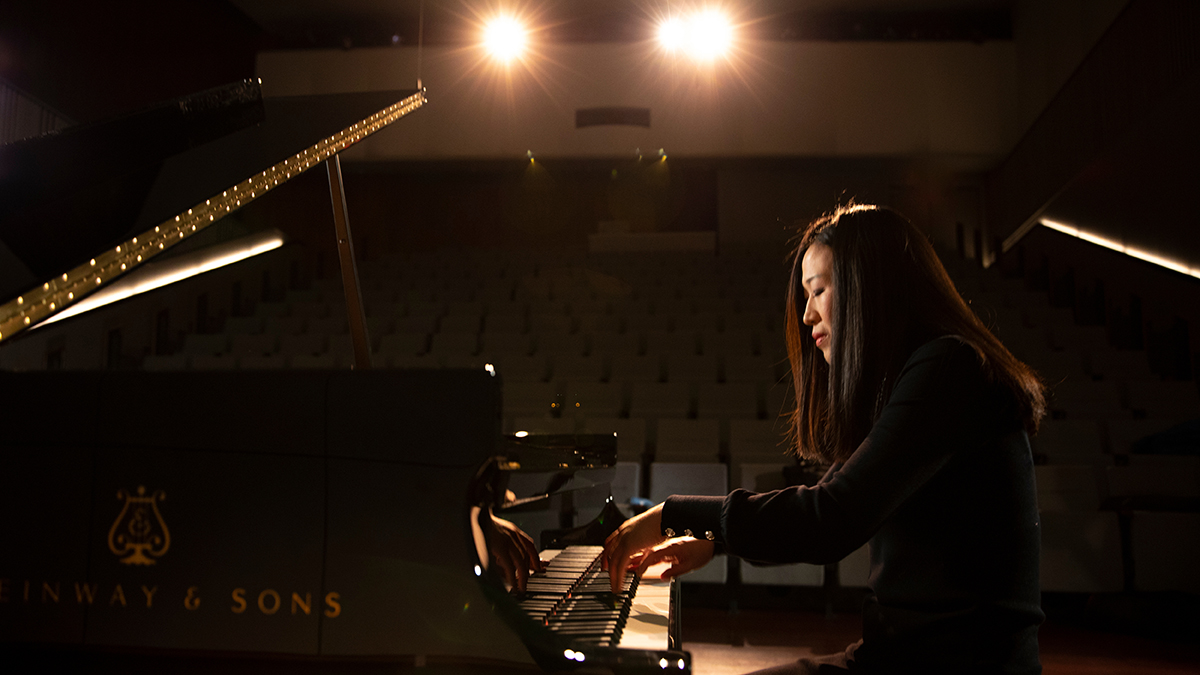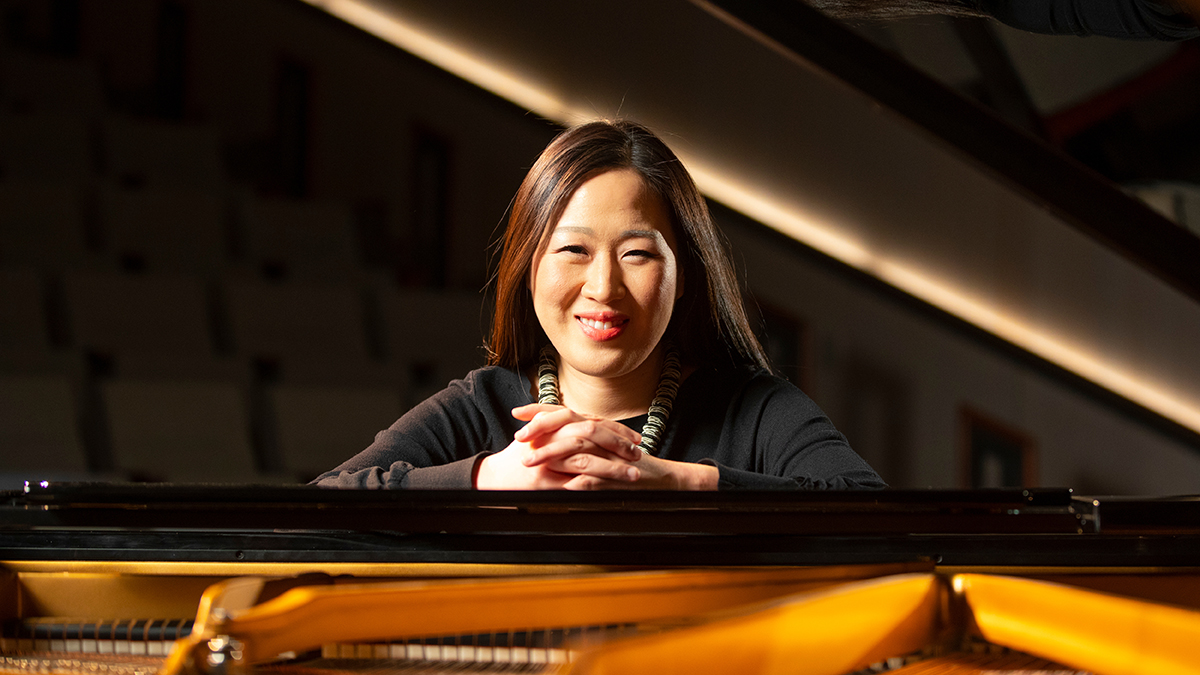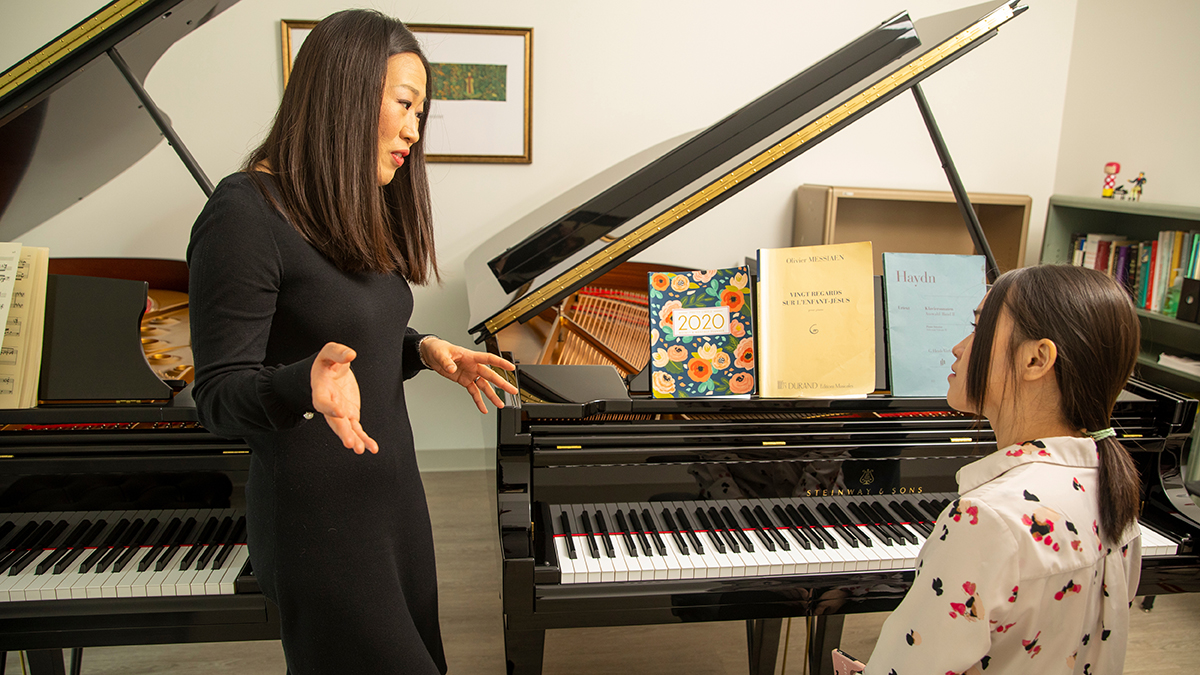Passing notes: Sharing a universal message through performance
Inside her office sit two grand pianos, with a desk pushed up against the corner. The sounds of students practicing drift through the walls. She prepares for performances in between lessons with students.
A Juilliard-trained pianist, Choi Witte, assistant professor of piano at Missouri State University, blends her teaching with a passion for performance.
She calls music a universal language. It speaks to everyone.
“When I’m performing, I’m trying to communicate with the audience through my music. It’s then up to the audience to decide how they’re going to receive it and how they’re going to translate it,” she said.
Taking music beyond the bounds
Choi Witte revels in the idea that music can cross cultural barriers that written language often can’t.
“It’s the one language for which you don’t need a translator,” she said.

As Dr. Minju Choi Witte practices on this Steinway piano, her music floods C. Minor Recital Hall.
She notes that music achieves its universality because human emotions are similar in every area of the world. You know someone is happy when they smile.
“You can connect with people on an honest, sincere, very raw level with music,” she said.
Choi Witte honed this idea in her 2018 piano album, “Boundless.” The title comes from her hope to embrace every aspect of your culture, even if you have more than one.
“Performance is impermanent. Recording “Boundless” was one way to make music more permanent for me. It feels good to have a tangible work that I can say, ‘This is what I did, and this is mine.’”
“I have two heritages: Korean and American,” she said. “With ‘Boundless,’ I wanted to explain that you can’t pull yourself into two pieces. You are one body.”
The record, consisting of three pieces in 11 tracks, draws inspiration from all corners of the world. American composers with international heritage composed each piece.
“The three composers can’t help but be influenced by their heritages,” Choi Witte said. “But, there are no boundaries in music. You can walk back and forth between many different parts of yourself.”
“The word boundless is saying there are no boundaries if you allow yourself to be inspired by your surroundings.”

What sets Dr. Minju Choi Witte’s performances apart? Her mastery lies in connecting with the music on a deep level.
The makeup of “Boundless”
Choi Witte’s colleague and friend Dr. Ching-Chu Hu composed the first piece, “Pulse.” It has subtle hints of Asian influence. The cadence of the four-track piece resembles the human heart as it experiences a whirlwind of emotions.
“I’ve had cardiologists sit in the audience when I perform ‘Pulse.’ They tell me at times it sounds like actual heartbeats,” Choi Witte said.
The second piece, “Sonata Andina No. 1,” draws from Latin American influence. Dr. Gabriela Lena Frank, pianist, composer and Guggenheim Fellow, combined the western sonata form with Andean folk music traditions.
“Gabby’s work is very much about the juxtaposition of two cultures, and how one doesn’t have to overpower the other,” Choi Witte said.
“Sonata Andina No. 1” uses the piano as an imitator of other instruments, such as guitar, drums, flute and marimba.
Dr. Philip Lasser, Choi Witte’s former Juilliard professor, composed the final piece “Sonata for Piano Les Hiboux Blancs ‘The White Owls.’” It’s French-inspired music that has followed Choi Witte throughout her career.
“It was the first contemporary piece I fell in love with,” she said. “I’ve known it since college, and I’ve performed it numerous times in the 17 years it’s been with me.”
Bringing meaning to the stage
Choi Witte’s mastery lies in performing works. For every piece she plays, she searches for a deeper meaning, something that helps her and the audience connect to the music.
“Sometimes you are given pieces that you don’t have a choice about,” she said. “It’s up to you to find something in the music that is convincing and meaningful because people naturally understand sincerity.”

In Dr. Minju Choi Witte’s office, she provides guidance to her music students.
She shares this wisdom with her students at Missouri State.
“I tell them it doesn’t matter if you don’t like the piece, because part of being an artist is connecting to whatever you’re given and taking it to the sky,” she said.
“I think a lot of different types of personalities can enjoy contemporary music. It has no pillars or traditions that dictate how you are supposed to perceive it.”
Performing someone else’s music adds another layer of pressure, but Choi Witte’s collaborators on “Boundless” trusted her artistry with their compositions.
“With Minju on stage, I can relax and let her playing transport me to the emotions I wish to convey,” said Hu, composer of “Pulse.” “I know I’m in very safe hands with Minju. She commands the piano and creates such beautiful sounds that she brings the music to life.”
Choi Witte admits she still gets nervous before performances.
“It helps to think about my students,” she said. “I’m teaching them to be the best they can be. The more I challenge myself and invest in becoming the best musician I can be, I can pass that on to them.”
- Story by Lauren Stockam
- Photos by Bob Linder
- Video by Chris Nagle

